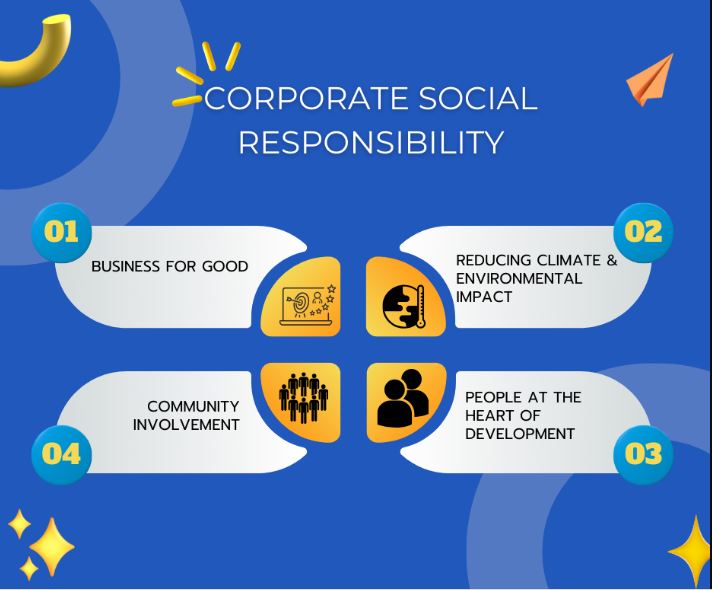
7 fastest means to perform CSR this year
Corporate social responsibility can be described as an organisation’s action or set of actions that show its dedication to the economic, environmental, and social development of its operations and the welfare of its stakeholders. Organisations use it to meaningfully contribute to the well-being of the local environment in which they operate while ensuring that economic development and technological advancement benefit a large part of the population in which they operate.
CSR is a potent tool that needs to be considered and used by going concerns in the country. Even though beautification of the environment, handing out scholarships with school materials support, supporting MSMEs, and picking up projects in government parastatals are some great ways organisations have been carrying out their CSR, there are so many other sustainable ways all businesses can take part in this without breaking a bank.
A great corporate social responsibility program should address one or more issues on food security, good education, quality healthcare, and improved quality of life for employees, their families, and the community. Aside from these basic project pointers, having a sustainability drive on the front burner makes the drilling down process more target-oriented, focused, and much easier for any small business to take part in. This aspect of narrowing down the appropriate CSR for your company may seem cumbersome, time-consuming, and resource-demanding. However, it makes a huge difference and pays off in the long run if painstakingly and professionally done, especially by large corporations.
A great corporate social responsibility programme should address one or more issues on food security, good education, quality healthcare
In most businesses, however, there are quicker and even more strategic ways organisations can perform their CSR functions without deviating from their line of business. It makes more sense and becomes more effective, yielding outstanding results when the CSR programme gets etched around the organisation’s line of business rather than projects they have little or no knowledge or control. A great example of this was Crocs’ provision of their footwear to healthcare workers during the Covid-19 pandemic. By doing so, they have indirectly improved the quality of work offered by the first responders by providing convenience in maintaining a sterile work environment. Crocs’ kind gesture must have encouraged healthcare workers to be more dedicated to their line of work (which is to save lives), knowing that they are recognized and valued for all their efforts. In return, the organisation gained brand loyalty, enjoyed support, and established design collaborations and partnerships with different companies in the shoe-making business.
Regardless of size, here are seven quick ways an organisation can adopt a CSR programme:
Provide free bus rides, healthy breakfast, and or lunch programs at work. This kind gesture can also be extended to the locals especially if you operate a food business to curb waste or render a logistics service with some handy idle periods. Also, such programs can be performed through NGOs or trusted charitable causes.
Provide rebates to students, the elderly, and other groups connected to your business ideals. Apple and Crocs give up to 10% and 25% discounts, respectively, to students who buy their products provided they have proof of identification and a verifiable school email address.
Identify your top three business values and stay true to them. A pharmaceutical company can act responsibly by ensuring they provide safe, quality, and affordable medicines to everyone who needs their products while being mindful of their need for support throughout their healthcare.
Ensure any of your business activities do not impact the environment adversely. For example, put your waste products to good use rather than allow them to litter the environment to cause more harm than good. A pure water manufacturing company can psychologically provide incentives to end-users by rewarding the return of empty plastic pouches. This will discourage people from dropping off plastic waste on their streets and prevent littering and blockage of the community drainage channels. In a state in the US, whenever you buy multipacks of bottled water, you are charged an extra five cents per bottle. Although it is refundable once you return the empty bottles to the store, the impact of the awareness created is commendable.
Improve your employees’ financial wellness through stock options, cooperative drives, and financial literacy. Boost their financial and physical well-being with up-to-date pension contributions and health insurance. Extend an employee assistance program (EAP)to include family members.
Drive your business ideas with impact and sustainability. Ask your employees and community to suggest worthy projects or causes, and evaluate how your organisation can support them in ways that will be impactful yet sustainable rather than engaging on a one-off or seasonal basis.
Ensure you cover the crucial focal points of corporate social responsibility – economic, environmental, social, and governance. Pulling off a successful CSR program(s) without incorporating the tenets of ESG may be somewhat daunting. They often go hand in hand for a reason, so explore them for a huge impact.
Bottomline:
You would agree with me that there are numerous benefits and positive impacts of corporate social responsibility yet to be recorded if we make a conscious effort to do it right. Some of such that come to mind as they relate to their impact on employees include increased employee engagement, reduced staff turnover and attrition, increased productivity, creativity and profitability, reduced absenteeism and presenteeism, brand loyalty, endearment, and community pride. Therefore, using it as a tool for an integrated wellness approach, carefully identify the most appropriate CSR programme your organisation should adopt. State the reasons and the benefits to your business, employees, and local community.






